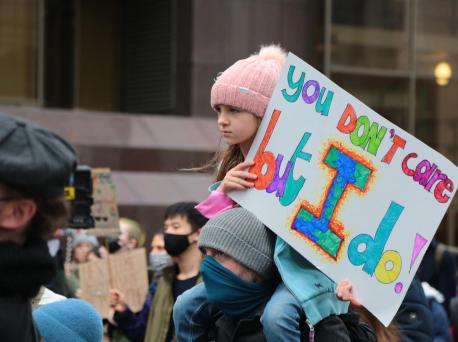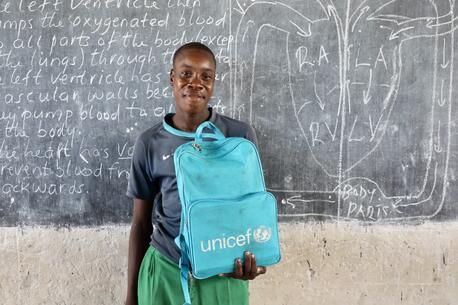
In the Fight for Climate Action, Girls' Voices Must Be Heard
The past seven years have been the hottest on record, and the impacts are not gender-neutral: an estimated 4 out of 5 people displaced by climate change are girls and women. Yet less than 2 percent of national climate strategies mention girls. UNICEF is working to amplify the voices of girls and young women in the fight to protect the planet.
As the weather becomes more unpredictable and extreme, girls and women often bear a greater burden. Girls are the first to drop out of school to take on domestic chores, like fetching safe water. They're also more likely to be forced into child marriage. All the more reason to make sure that the next generation of girls have a say in the policies that will shape their lives and futures.
Climate change disproportionately affects young women and girls
When young climate movement activists rallied in Barishal, Bangladesh in September 2021 to draw attention to the growing climate emergency and demand urgent action, young women were on the front lines, speaking out in full force. The climate strike was organized by a network of youth groups called the Alliance for Youth and Development (AYD), with support from UNICEF and in solidarity with Greta Thunberg's global climate movement.
Holding handmade posters reading "Allow Me to Have a Future" and "More Planet Less Plastic," hundreds of young people marched through the streets of Barishal, calling for change. "We came here to protest against the adverse effects of climate change we are bearing and to demand that our rights are protected," said Afshana Mim, 23.
Youth climate activists are fighting for a livable planet
Although Bangladesh is among the lowest per capita greenhouse gas emitting countries (bottom 20 percent), it is one of the hardest hit by climate change. Children there are victims of extreme weather, floods, river erosion, sea level rise and other environmental shocks driven by climate change.
"We know that Bangladesh was a six-season country, but we are losing the seasons day by day," warned 23-year-old Sumaiya Akhter Lima. "Because of this, it rains suddenly. It's too hot during summer and too cold during winter, which is also affecting our agriculture. If young people like us don't raise awareness, then the next generations will have to carry the impacts."
Climate change cannot be addressed without the voices and leadership of young women and girls. To better understand their perspective and experiences, UNICEF and the World Association of Girl Guides and Girl Scouts (WAGGGS) recently polled 33,523 girls and young women from 90 countries. Published this month, Bring in the Girls!: Girls' and young women's views on climate change sheds new light on how the climate crisis is shaping the experience of the next generation of women leaders — and what they are doing about it.
"People are not seeing instant results of climate change in their current lifestyles, and when they actually notice, it will be too late," warned a 17-year-old from Lebanon. "Climate change affects our studies and our way of living," said Diane, a 16-year-old from Rwanda. "Our society made us believe that it's girls' responsibility to fetch water or collect firewood. So as the weather changes, we are always at risk of missing school and taking over those responsibilities."
Girls and young women have a lot to say about climate change. UNICEF is listening
Nearly 8 out of 10 respondents (79 percent) believe girls have the power to mitigate the effects of climate change, and 80 percent say they have taken steps to preserve the environment, like recycling, saving energy or planting a garden. One-third report that when they take action, adults close to them join in.
"We know how to get ourselves out of any adverse situation, make our own place where they don't want us to enter, and change the things that don't seem right to us," said a 23-year-old woman from Argentina. "The creativity within each girl and young woman will be key to creating change."
Children are the least responsible for climate change, yet they will suffer most from its impact. UNICEF works with partners at global and local levels to elevate children's voices on climate change through creative platforms, advocacy and participation in major United Nations summits. Your contribution can make a difference. Please donate.
Top photo: A young girl holds a sign at a Fridays for Future demonstration for climate action in Glasgow, Scotland on Nov. 5, 2021. In August 2018, Greta Thunberg, then 15, started what became a movement, skipping school every Friday to stand outside the Swedish Parliament advocating for action on climate change. She was soon joined by activists from around the world. © UNICEF/UN0547131/Elwyn-Jones. Video edited by Tong Su for UNICEF USA
HOW TO HELP
There are many ways to make a difference
War, famine, poverty, natural disasters — threats to the world's children keep coming. But UNICEF won't stop working to keep children healthy and safe.
UNICEF works in over 190 countries and territories — more places than any other children's organization. UNICEF has the world's largest humanitarian warehouse and, when disaster strikes, can get supplies almost anywhere within 72 hours. Constantly innovating, always advocating for a better world for children, UNICEF works to ensure that every child can grow up healthy, educated, protected and respected.
Would you like to help give all children the opportunity to reach their full potential? There are many ways to get involved.



